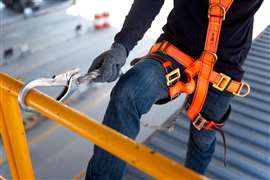Accidental deaths in the UK reach an “all-time high”
18 November 2024
 Photo: Getty Gallery via AdobeStock
Photo: Getty Gallery via AdobeStock
Accidental death rates in the UK are at an all-time high and have risen by 42% over the last decade.
That’s according to a report by RoSPA (Royal Society of the Prevention of Accidents), in partnership with Speedy Hire.
The ‘Safer Lives, Stronger Nation’ report found that accidental deaths are now the second biggest killer of people under 40, taking more than 20,000 lives each year, with construction accounting for 37% of fatal workplace accidents.
It found that almost half (46%) of all accidental deaths (over 9,700 people) in 2022 resulted from falls, which was the leading cause of death and injury from accidents.
Over a quarter (26%) resulted from poisonings and 7% were because of a road traffic accident or transport related incidents.
Falls also accounted for nearly two thirds (61%) of all accident-related hospital admissions (almost 450,000 instances).
Accidents from crushing, striking, powered hand tools and machinery (known medically as ‘exposure to inanimate mechanical forces’) accounted for over one in 10 (12%) of all accident-related hospital admissions, and 7% were because of a road traffic accident or transport related.
Accident-related hospital admissions
Accidental deaths have risen in England (up 48%), Scotland (up 60%), Wales (up 42%) and Northern Ireland (up 67%) since 2013, while in England alone accident-related hospital admissions for serious injuries have risen by 48% in the last two decades.
RoSPA’s new report also highlighted the strain accidents put on the NHS. In England in 2023, over 4.4 million bed days were used up to treat patients with accident-related injuries, costing the NHS an estimated £4.6 billion.
Across the UK, accidents led to around 5.2 million bed days, which come at an estimated cost of £5.4 billion to the NHS last year.
Meanwhile, accidents resulted in around 7 million Accident & Emergency (A&E) visits across the UK last year, costing a further £613 million, bringing the total cost of accidents to the NHS to at least £6 billion annually.
At the same time, it estimates that 7.7 million working days were lost by those who were unable to work after an accident as they’d been admitted to hospital, or by their carers who took time off work to be with them in 2022 and 2023.
A further 21 million working days were lost by those who had to attend A&E after an accident.
National Accident Prevention Strategy
Following the findings RoSPA is calling for the Government to create a National Accident Prevention Strategy, which it said will “save lives, boost the economy and free up capacity in the NHS.”
Becky Hickman, chief executive at RoSPA, said the report unveils “a new public health scandal.” She said“The UK is facing an accident crisis. We are all substantially more likely to suffer a serious accident today than we were 20 years ago. We must take action now to stop further preventable deaths and serious injuries – accidents are avoidable and do not need to happen.
“Even those who have never been involved in an accident are still suffering, as increasing numbers of accidents are choking the UK economy and engulfing the NHS – taking up bed space, money, time and resources that could be directed to other serious illnesses.”
Dan Evans, chief executive at Speedy Hire, added, “We take health and safety extremely seriously, and it is a source of immense pride that we have been recognised for our excellence in keeping colleagues and customers safe. For us, colleague safety doesn’t begin and end at the workplace door, which is why at Speedy Hire we take a ‘whole person, whole life’ approach.
“This has never been more important to do so, as RoSPA’s report reveals people are far more likely to suffer a serious accident at home than they are at work. Both the cost of accidents to peoples’ personal lives and to businesses is far too high, so we must act now to keep people safe and support economic growth.”
STAY CONNECTED



Receive the information you need when you need it through our world-leading magazines, newsletters and daily briefings.
CONNECT WITH THE TEAM






